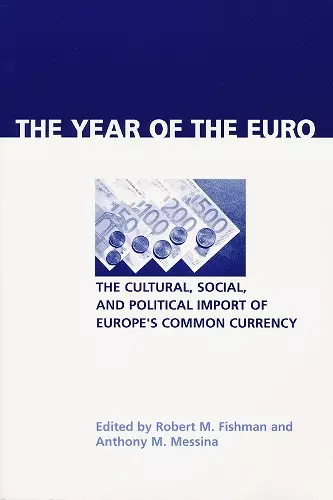Year of the Euro
The Cultural, Social, and Political Import of Europe's Common Currency
Anthony M Messina editor Robert M Fishman editor
Format:Paperback
Publisher:University of Notre Dame Press
Published:17th Feb '06
Currently unavailable, and unfortunately no date known when it will be back

The Year of the Euro examines the wide-ranging importance of Europe’s new single currency beyond its impact on financial markets and the economy itself. On January 1, 2002, when the new currency began to circulate in the twelve participating member states of the European Union, the long move toward a supranational European framework for trade and institutions finally entered the fabric of daily life for hundreds of millions of citizens. The contributing authors to this highly readable and interdisciplinary volume offer a variety of perspectives on this extraordinary episode in currency change and European convergence. The book’s essays offer the assessments of leading scholars of European affairs—from the fields of history, political science, sociology, and law—as to whether the new common currency will reshape the continent’s cultures, societies and political systems and, if so, in what ways. The discussions and debates found in these pages will inform those, within and outside academia, who are interested in the future of Europe and in the meaning of national currencies. The volume is also suitable for classroom use in courses on the European Union, cultural and economic sociology, comparative politics, and contemporary Europe.
"This is one of the most interesting and original books in the burgeoning field of EU studies to have emerged in recent years. Its emphasis on the likely social and cultural—not just political and economic—impact of the euro at the national, subnational, and supranational levels is timely and refreshing. Tightly edited, this book should be essential reading for professional and amateur EU-watchers alike." —Desmond Dinan, Jean Monnet Professor of Public Policy, George Mason University
"If the nineteenth and twentieth centuries brought a dramatic nationalization of government-backed currencies across the world, does the euro's introduction in 2002 write finis to the era of nationalism? Here, superbly informed observers of European politics, economy, and social life debate that question from multiple perspectives, not only documenting the depth of the euro's challenge, but also mapping alternative futures for Europe. An illuminating intervention in a vital conversation." —Viviana A. Zelizer, Lloyd Cotsen '50 Professor of Sociology, Princeton University
"The euro has quickly become a world currency, and this excellent work explains how this came about. It does the job, not only by looking at the economic factors involved, but also at political, legal, social, and cultural factors—all in a very creative and readable manner." —Richard Swedberg, Cornell University
"This collection should be of interest to all those concerned with the viability and implications of the euro changeover, as well as with the broader theoretical issues posed by this extraordinary historical experience. The book is intended to contribute to existing scholarship and to encourage future academic work, but it is also designed to be fully accessible and broadly informative for readers outside conventional academic circles who are interested in Europe's experience with currency union." —Abstracts of Public Administration, Development and Environment
ISBN: 9780268028817
Dimensions: 229mm x 152mm x 18mm
Weight: 445g
342 pages